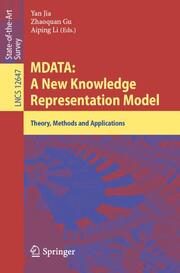Detailansicht
MDATA: A New Knowledge Representation Model
Theory, Methods and Applications, Lecture Notes in Computer Science 12647 - Information Systems and Applications, incl. Internet/Web, and HCI
ISBN/EAN: 9783030715892
Umbreit-Nr.: 869493
Sprache:
Englisch
Umfang: x, 255 S., 23 s/w Illustr., 255 p. 23 illus.
Format in cm:
Einband:
kartoniertes Buch
Erschienen am 07.03.2021
Auflage: 1/2021
- Zusatztext
- Knowledge representation is an important task in understanding how humans think and learn. Although many representation models or cognitive models have been proposed, such as expert systems or knowledge graphs, they cannot represent procedural knowledge, i.e., dynamic knowledge, in an efficient way.This book introduces a new knowledge representation model called MDATA (Multi-dimensional Data Association and inTelligent Analysis). By modifying the representation of entities and relations in knowledge graphs, dynamic knowledge can be efficiently described with temporal and spatial characteristics. The MDATA model can be regarded as a high-level temporal and spatial knowledge graph model, which has strong capabilities for knowledge representation. This book introduces some key technologies in the MDATA model, such as entity recognition, relation extraction, entity alignment, and knowledge reasoning with spatiotemporal factors. The MDATA model can be applied in many critical applications and this book introduces some typical examples, such as network attack detection, social network analysis, and epidemic assessment. The MDATA model should be of interest to readers from many research fields, such as database, cyberspace security, and social network, as the need for the knowledge representation arises naturally in many practical scenarios.
- Kurztext
- Knowledge representation is an important task in understanding how humans think and learn. Although many representation models or cognitive models have been proposed, such as expert systems or knowledge graphs, they cannot represent procedural knowledge, i.e., dynamic knowledge, in an efficient way.This book introduces a new knowledge representation model called MDATA (Multi-dimensional Data Association and inTelligent Analysis). By modifying the representation of entities and relations in knowledge graphs, dynamic knowledge can be efficiently described with temporal and spatial characteristics. The MDATA model can be regarded as a high-level temporal and spatial knowledge graph model, which has strong capabilities for knowledge representation. This book introduces some key technologies in the MDATA model, such as entity recognition, relation extraction, entity alignment, and knowledge reasoning with spatiotemporal factors. The MDATA model can be applied in many critical applications and this book introduces some typical examples, such as network attack detection, social network analysis, and epidemic assessment.The MDATA model should be of interest to readers from many research fields such as database, cyberspace security, and social network, as the need for the knowledge representation arises naturally in many practical scenarios.
